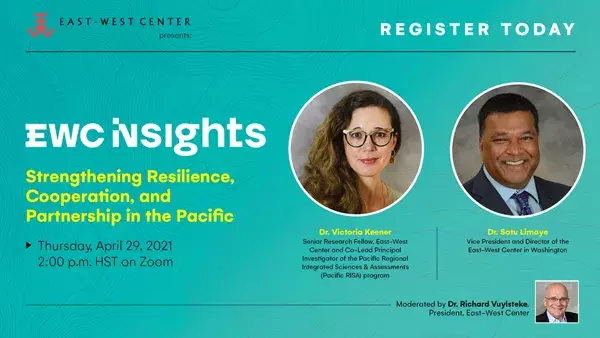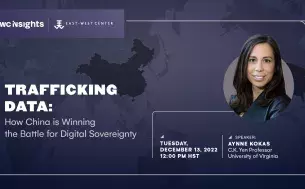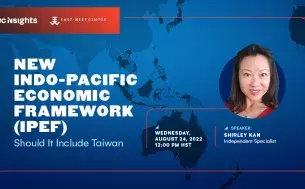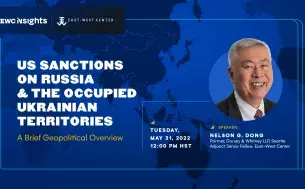Error message

OFFICE/DEPARTMENT
Challenges now confronting the people of the Pacific Islands, such as climate change and the COVID-19 pandemic, make the need for regional cooperation and community solidarity greater than ever. Promoting collaboration among nations and within communities to meet such challenges was at the heart of a recent East-West Center virtual workshop, “Strengthening Resilience, Cooperation, and Partnership in the Pacific.” Supported by the Government of Japan, the March 25 workshop convened a select group of academics, practitioners, and policy professionals from Australia, Japan, New Zealand, Pacific Islands countries, and the US with expertise in regional dynamics, compound climate threats, and disaster recovery mechanisms, pertinent to the region.
Workshop co-leaders Dr. Victoria Keener and Dr. Satu Limaye, interviewed by EWC President Richard Vuylsteke, will take us through the workshop's key findings.
Dr. Victoria Keener is a Senior Research Fellow at the East-West Center, the Co-Lead Principal Investigator of the NOAA Pacific Regional Integrated Sciences & Assessments program, and the Lead Author of the Hawaii and Pacific Islands chapter of the 4th US National Climate Assessment. Dr. Keener also serves as the Chair of the City & County of Honolulu Climate Change Commission, which provides science-based recommendations to the Mayor and City Council. She earned a PhD in Agricultural & Biological Engineering from the University of Florida, specializing in hydro-climatological research. Dr. Keener leads an interdisciplinary research team of social and physical scientists that aims to reduce Pacific Islands’ vulnerability to climate change by translating research into actionable knowledge and working with a variety of stakeholders at the local, state, and regional level. Projects include producing downscaled climate and hydrological projections to estimate future water availability; assessing stakeholders’ decision-support needs and their capacity to use seasonal forecasts; impacts of climate and health on migration; and ecosystem service valuation and modeling.
Dr. Satu P. Limaye is Vice President of the East-West Center and the Director of the East-West Center in Washington where he created and now directs the Asia Matters for America initiative and is the founding editor of the Asia Pacific Bulletin. He is also a Senior Advisor at CNA Corp (Center for Naval Analyses) and Senior Fellow on Asia History and Policy at the Foreign Policy Institute at Paul H. Nitze School of International Studies (SAIS). He is magna cum laude and a Phi Beta Kappa graduate of Georgetown University and received his doctorate from Oxford University (Magdalen College) where he was a George C. Marshall Scholar. Recent publications include: “America’s ‘Pacific Principle’ in an Indivisible Pacific Islands Region,” (Asia-Pacific Bulletin); “Despite Stumbles, America’s Engagement with Southeast Asia Runs Deep,” (Global Asia); Raging Waters: China, India, Bangladesh, and Brahmaputra Water Politics (Marine Corps University Press); and Russia’s Peripheral Relevance to US-Indo Pacific Relations (Center for the National Interest).
Dr. Richard Vuylsteke has been President of the East-West Center since January 1, 2017. Former positions include president of the American Chamber of Commerce in Hong Kong; president of the American Chamber of Commerce in Taipei; editor-in-chief of the Taiwan Review; area studies coordinator at the Chinese Language and Area Studies (CLASS) Foreign Service Institute school in Taipei; research fellow in East Asian Legal Studies at Harvard Law School; as well as a Fulbright scholar at the University of Rajasthan, India. MA and PhD from the University of Hawai‘i at Mānoa, specializing in Western and Chinese political philosophy. Areas of expertise include strategic and operational leadership of multicultural organizations, Asia-Pacific business and trade, Asian and Western history and philosophy.
Challenges now confronting the people of the Pacific Islands, such as climate change and the COVID-19 pandemic, make the need for regional cooperation and community solidarity greater than ever. Promoting collaboration among nations and within communities to meet such challenges was at the heart of a recent East-West Center virtual workshop, “Strengthening Resilience, Cooperation, and Partnership in the Pacific.” Supported by the Government of Japan, the March 25 workshop convened a select group of academics, practitioners, and policy professionals from Australia, Japan, New Zealand, Pacific Islands countries, and the US with expertise in regional dynamics, compound climate threats, and disaster recovery mechanisms, pertinent to the region.
Workshop co-leaders Dr. Victoria Keener and Dr. Satu Limaye, interviewed by EWC President Richard Vuylsteke, will take us through the workshop's key findings.
Dr. Victoria Keener is a Senior Research Fellow at the East-West Center, the Co-Lead Principal Investigator of the NOAA Pacific Regional Integrated Sciences & Assessments program, and the Lead Author of the Hawaii and Pacific Islands chapter of the 4th US National Climate Assessment. Dr. Keener also serves as the Chair of the City & County of Honolulu Climate Change Commission, which provides science-based recommendations to the Mayor and City Council. She earned a PhD in Agricultural & Biological Engineering from the University of Florida, specializing in hydro-climatological research. Dr. Keener leads an interdisciplinary research team of social and physical scientists that aims to reduce Pacific Islands’ vulnerability to climate change by translating research into actionable knowledge and working with a variety of stakeholders at the local, state, and regional level. Projects include producing downscaled climate and hydrological projections to estimate future water availability; assessing stakeholders’ decision-support needs and their capacity to use seasonal forecasts; impacts of climate and health on migration; and ecosystem service valuation and modeling.
Dr. Satu P. Limaye is Vice President of the East-West Center and the Director of the East-West Center in Washington where he created and now directs the Asia Matters for America initiative and is the founding editor of the Asia Pacific Bulletin. He is also a Senior Advisor at CNA Corp (Center for Naval Analyses) and Senior Fellow on Asia History and Policy at the Foreign Policy Institute at Paul H. Nitze School of International Studies (SAIS). He is magna cum laude and a Phi Beta Kappa graduate of Georgetown University and received his doctorate from Oxford University (Magdalen College) where he was a George C. Marshall Scholar. Recent publications include: “America’s ‘Pacific Principle’ in an Indivisible Pacific Islands Region,” (Asia-Pacific Bulletin); “Despite Stumbles, America’s Engagement with Southeast Asia Runs Deep,” (Global Asia); Raging Waters: China, India, Bangladesh, and Brahmaputra Water Politics (Marine Corps University Press); and Russia’s Peripheral Relevance to US-Indo Pacific Relations (Center for the National Interest).
Dr. Richard Vuylsteke has been President of the East-West Center since January 1, 2017. Former positions include president of the American Chamber of Commerce in Hong Kong; president of the American Chamber of Commerce in Taipei; editor-in-chief of the Taiwan Review; area studies coordinator at the Chinese Language and Area Studies (CLASS) Foreign Service Institute school in Taipei; research fellow in East Asian Legal Studies at Harvard Law School; as well as a Fulbright scholar at the University of Rajasthan, India. MA and PhD from the University of Hawai‘i at Mānoa, specializing in Western and Chinese political philosophy. Areas of expertise include strategic and operational leadership of multicultural organizations, Asia-Pacific business and trade, Asian and Western history and philosophy.









